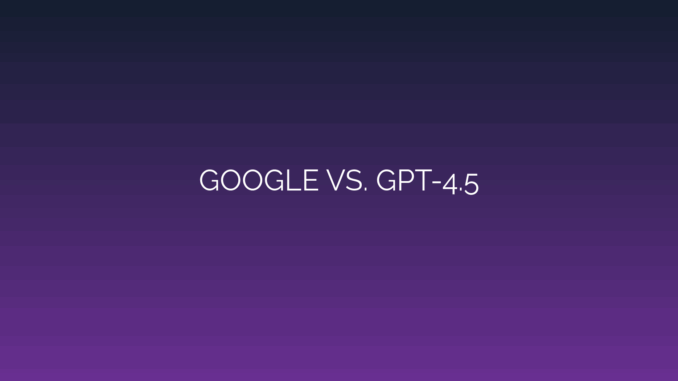
The AI Revolution: Google Search and GPT-4.5 in Head-to-Head Competition
The battle for dominance in the artificial intelligence landscape has escalated dramatically, pitting decadesold giants against nimble innovators. At the forefront stand Google, the undisputed leader in internet search and contextual advertising, and GPT4.5, OpenAI’s frontier large language model. This rivalry transcends a simple “search engine vs. chatbot” dichotomy—it represents a fundamental shift in how humanity accesses, processes, and leverages information. Here, we dissect this monumental clash, examining technical foundations, practical applications, and future trajectories.
The Contenders: Origins and Philosophies
Google’s Integrated Ecosystem Google’s influence stems from its ubiquitous search engine and cloud infrastructure. Powered by advanced indexing algorithms, PageRank refinements, and increasingly potent AI like the Gemini project, Google emphasizes information retrieval augmented by contextual credibility. Search results prioritize realtime web data, user location, and verified sources. Recent AI integrations—such as generative overviews and smart compose—aim to streamline answers within familiar search interfaces. Crucially, Google monetizes through a sophisticated advertising model informed by user data, making accessibility its cornerstone.
GPT4.5: The Autoregressive Powerhouse Developed by Anthropic (as a successor to OpenAI’s frameworks), GPT4.5 represents a leap in generative capabilities. Trained on colossal datasets, it specializes in complex problemsolving, conversational depth, and creative output. Unlike Google’s webcrawling approach, GPT4.5 relies on parametric knowledge—information absorbed during training—to generate responses. This enables nuanced reasoning, summarization across lengthy documents, and domainspecific customization via tools like ChatGPT Pro. Its philosophy centers on simulating humanlike interaction, excelling at openended dialogue rather than delivering linkbased results.
Technical Distinctions: How They Work
| Criterion | Google | GPT4.5 | |||| | Data Source | Live web indexing + proprietary databases | Pretrained static datasets (snapshot up to mid2023) | | Core Mechanism | Ranking/relevance algorithms + generative overlays | Transformer architecture (autoregressive prediction) | | Speed | Milliseconds for search results | Seconds for complex generative responses | | Knowledge Cutoff| Realtime web updates | Fixed (e.g., April 2023 for data snapshots) | | Strengths | Fresh data, multisource verification, commerce | Abstract reasoning, language fluency, creative tasks |
Key Differentiators in Capability
Information Access Google thrives on immediacy. Searching for “current climate policy trends” yields articles, legislative updates, and experts’ analyses updated minutes ago. Its infrastructure constantly reevaluates source credibility—penalizing spam while prioritizing hightraffic domains. GPT4.5, however, lacks live web access by default. While plugins can enable browsing, its core strength lies in interpreting existing knowledge without external references. Its answers draw on learnt patterns, excelling at theoretical syntheses (e.g., explaining quantum computing metaphors) but risking hallucinations if metadata lacks precision.
User Experience and Versatility
- Best for research/reference tasks: Google with its snippet-rich results and source evaluation.
- Best for synthesis/creativity: GPT-4.5 for drafting emails, ideating code, or producing narratives.
- Personalization: Google personalizes based on history/location; GPT-4.5 adapts style/tone via prompt engineering.
- Multimodality: Both handle text, images, and code, but GPT-4.5 exhibits stronger vision-language capabilities for tasks like diagram interpretation or meme generation.
Commercial Models Google funds innovation through integrated advertising—placing targeted ads alongside search and Gmail. Its AI adds value by understanding user intent to maximize ad relevance. GPT4.5, meanwhile, relies on OpenAI’s freemium API licensing and subscription services (e.g., GPT Plus). Enterprises pay for finetuned applications, shifting monetization toward developer ecosystems and premium features.
Critical Challenges and Risks
Both technologies confront public skepticism:
- Bias and Ethics: Google faces accusations of algorithmically reinforcing societal biases. GPT-4.5 struggles with reasoning stability—counterfactuals or leading questions risk erroneous responses.
- Misinformation: Google’s scale makes it vulnerable to SEO spam. GPT-4.5 may generate plausible-sounding falsehoods without clear disclaimers.
- Data Privacy: Google’s data-mining attracts regulatory scrutiny. GPT-4.5, often trained on publicly scraped data, sparks copyright debates.
Experts like Tim BernersLee advocate for watermarking and attribution systems to address these concerns. However, neither platform has fully resolved conflicts between scale, accuracy, and ethics.
The Road Ahead: Convergence or Conflict?
ShortTerm Outlook (1–3 Years) Google is aggressively integrating AI agents into search—anticipating queries instead of reacting to them. With initiatives like Project Astra and multimodal GeminiNano, it aims to replicate conversational fluidity while retaining realtime validity. GPT4.5 will likely expand ecosystem integrations, becoming a backbone for Copilots in Microsoft Word, Salesforce CRMs, and bespoke enterprise tools. Expect fierce competition in API pricing and speed to capture developer loyalty.
LongTerm Disruption (5+ Years) The lines will blur further:
- Search Engines → Answer Engines: Google may evolve into proactive personal assistants using generative agents.
- LLMs → Multimodal OS Interfaces: GPT-4.5 could power operating systems, handling workflows beyond chat via robocalls or wearable tech.
- Regulatory Divides: Stricter AI acts in the EU and U.S. will influence how knowledge datasets are curated and licensed.
Final Analysis: Synergy Over Supremacy
Despite surfacelevel opposition, Google and GPT4.5 ultimately reflect complementary paradigms. Google excels at finding verified information others have produced; GPT4.5 excels at creating original content and abstract reasoning. For professionals:
- Leverage Google for market research, citations, and zero-day updates.
- Deploy GPT-4.5 for drafting, brainstorming, or simplifying technical concepts.
The winner? Endusers who embrace both. As AI permeates industries, fluency across these tools will define efficiency. Still, concerns linger about market consolidation—Google’s vast datasets paired with publishing leverage could stifle LLM diversity. Meanwhile, regulatory consensus on ethics could steer whether these technologies democratize access or amplify information asymmetry.
In conclusion, the GoogleGPT rivalry isn’t binary. It’s a dynamic tension accelerating AI evolution, with each forcing the other toward unprecedented ingenuity. Their coexistence reshapes our cognitive workflows—and the future hinges not on who “wins,” but how society harnesses both to augment human potential.
Word Count: 998
Leave a Reply